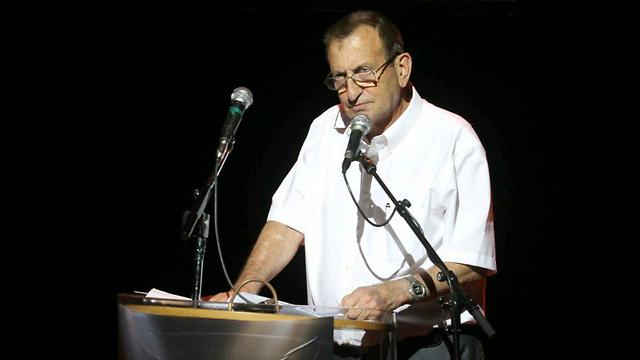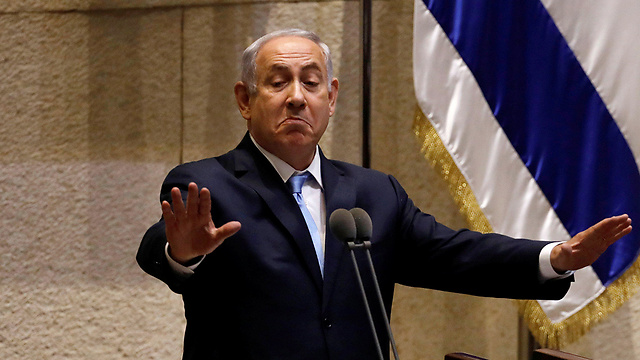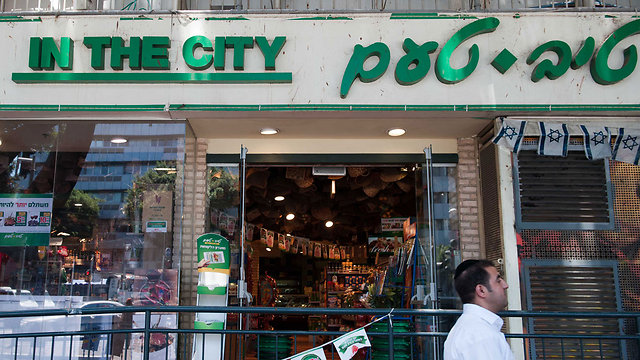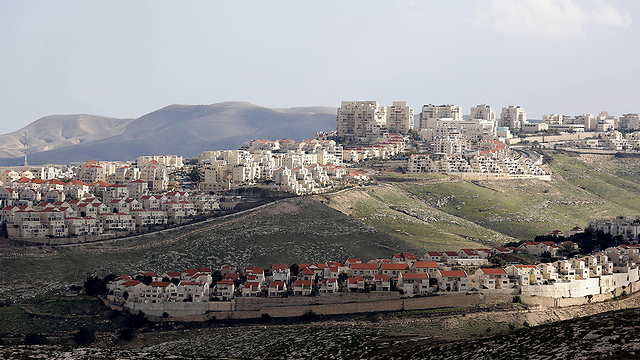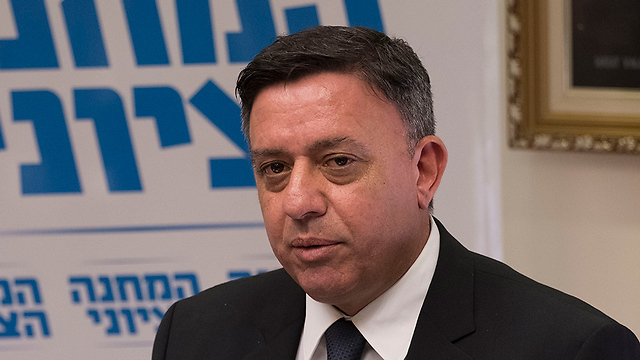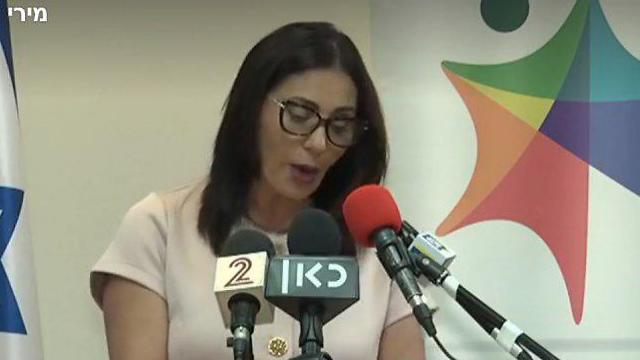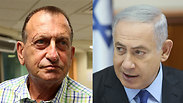

Tel Aviv's mayor pans PM's 'power-drunk' conduct
Speaking in a special interview with Yedioth Ahronoth, Ron Huldai decries Netanyahu's 'sourpuss speech' as 'vulgar, made by a government that thrives on inciting one sector against another, and by a person in distress who can't manage to maintain any stateliness.'
On Thursday afternoon, April 27th this year, the mayor of Tel Aviv-Jaffa was sitting with some friends at the Hapina Hayeruka café on the banks of the Yarkon River. The Labor Party primaries were the burning topic of conversation. It was the last day you could announce your candidacy for head of the party. The hot name discussed there was, of course, the former minister, Avi Gabbay. Other hot names, like Stav Shafir and General Yom Tov Samia, had already announced that they would not be running. But the people sitting around the table knew all too well that there was someone else who was deciding whether to run—even now, two hours before the list would be closed.
His name is Ron Huldai.
"Truthfully, I didn't make a decision until the very last minute," Huldai reveals in an interview with Yedioth Ahronoth. "We were sitting at the café at two o'clock and I was talking about my hesitations. The list was closing at four."
What did your friends around the table have to say?
"Go there now and register."
I assume that you consulted with Amos Oz, who grew up in your home on Kibbutz Hulda.
"We are very good friends and I consult with him quite often about things having to do with values or dilemmas of a principled nature. So, we also spoke about running in that race. And he was of the opinion that I should run for head of the party. Over the years, I have considered it a few times, but the last time I wavered more than in the past."
Why?
"Because I understood that if I run, I will also win and become head of the Labor Party. This time, unlike the previous times, I was sure about that."
Why were you so confident? Did you see any polls?
"I don't need polls and I don't need advisors to know where I stand. By the way, I also believed I would have beat Shelly Yachimovich and Bougie Herzog."
So, in the end, what happened there at Hapina Hayeruka?
"I looked at my watch at 3:30, and didn't go."
*
If there won't be any unexpected changes, in October 2018 Ron Huldai will run for mayor of Tel Aviv-Jaffa for the fifth time and also mark 20 years in office. He will thus break the previous record of the number of years in office which Shlomo ("Cheech") Lahat set.
So what caused you to make that decision, to remain in Tel Aviv and not run for office in the Labor Party?
"I had some sleepless nights over that, and I usually sleep really well. But, ultimately, when I looked at the entire equation – starting with what I'm doing and what I still can do, and including my age – I'm already 73, and the government structure in the State of Israel – I asked myself what I could achieve in the short amount of time at my disposal. I knew just how much has to be fixed in this country. As you know, it took me nearly a term to publish this booklet called The City Profile, another five years to write a booklet called The City's Vision, and another five years to derive the city's zoning plan from it. There are processes, they take time. I felt I no longer had the needed time."
You were simply too late?
"Perhaps. I also said to myself: I've been a public servant my whole life. Is this the right thing to do now – when I've reached a place where I enjoy what I'm doing – in the most fundamental sense, when I've struck a balance between my private life and my work, when I can walk around freely on the street without bodyguards, and so on and so forth – should I take a step like that?"
Where was your wife Yael in all of this?
"My wife is always with me. As you may know, she didn't want me to run for mayor, but as soon as I stood up and ran – she was at my side like a lioness. Had I decided to run, she would have been totally on board."
Do you ever feel you've missed out on something because of that decision?
"I sometimes feel that I've missed out. I'm running for mayor of Tel Aviv-Jaffa next year and there is plenty to do in that regard. I'm busy and have a lot of satisfaction, but when I see what's happening in the country these days – that feeling of a missed opportunity emerges, that perhaps it would have been possible to change the reality here and what is happening to us as a democratic society."
What do you mean?
"In Israel, we're dealing today with ethical problems – and in that area the present government – and I don't want to sound pompous - is simply really bad. It's a government that corrupts: it is primarily corrupting the foundations of democracy which recognizes the rights of minorities and it's also weakening the courts. At the same time, they're inching their way toward religious law at the expense of civil liberties. I look at what's happening in Turkey and I'm concerned."
Why Turkey? Do you see a parallel between what's happening there and what's happening here?
"Look, Turkey used to be one of the most vibrant, most beautiful and most advanced democracies, and it is slowly undergoing Islamization and has become a dictatorship. We're living in a reality where, regrettably, some people are taking an example from the Turkish model and are trying to undermine the foundations of democracy. We may still find that we've become a different country than we used to be."
"When I see everything that's happening among our leadership, with the hedonism and the gifts, I'm reminded of my home on Kibbutz Hulda. In the afternoon hours, our house was always full of kids who had no place to go on the kibbutz. My parents were educators – my father was a school principal and my mother a teacher – and when a child had a problem, they would take him in. The house was always full of kids like that, kids from outside the kibbutz. Their parents were always grateful and would bring gifts to us, like a box of chocolates for instance. But my mother would refuse to accept them. To them she would say 'no thank you' and to us: 'he who hates gifts will live.' Granted, we're not in the same place, at the Hulda of those days. But the way the Prime Minister conducts himself, what's happening with the gifts Netanyahu receives, that's already criminal. I believe that even Likud voters understand that. I promise you that they see it too and also wonder about the French Law, which all of a sudden came up. That idea didn't come up before the Prime Minister was threatened with an indictment. Something like that doesn't occur in a functioning democracy. But, nonetheless, I'm an optimist."
How are you optimistic?
"As I see it, for a certain amount of time things here will get even worse. But after that people will wake up, come to their senses and replace the Likud leadership. As I said, the Israeli public, including Likud voters, are beginning to realize that this cannot go on. Even people on the right understand that having a functioning democracy is important, that the tyranny of the majority is not the main thing and that, ultimately, it will collapse. That doesn’t mean that the right as a whole is a disappearing movement. No. But the system, the aggressiveness, the cockiness, the power trip, and this 'there is none besides me' – will cause this government to collapse. Even if the right will still have a majority, the behavior of that right will be different.
"I feel the same way about the law enforcement systems. Because despite all the attempts to undermine them – and today that is being done aggressively and callously - they will prevail. I'm also convinced that if there have to be indictments – they should indict."
Netanyahu? "Decided Not to Decide"
In November 1998, shortly after being elected mayor for the first time, one of Huldai's good friends came to his office. It turned out that this friend had received a tempting job offer from a well-known and wealthy businessman who has widespread business interests in the city. The friend had come to tell Huldai about the offer. "We looked at one another and smiled," Huldai recalls. "Words were unnecessary between us. In any case, to remove any doubt, I said to him: If you want to be my friend, you can't represent him. Choose between us. I didn't even need to tell him in explicit terms. It was clear that he also understood the implications of it."
And what did he decide?
"To continue being my friend. Obviously, he told me about it knowing in advance what my answer would be. But why am I telling you this now, 19 years later? Because we have a problem in our government system today. There are things which I cannot define other than by saying 'it's not done' – that it's not the right thing to do. In all of Netanyahu's conduct surrounding Attorney Shimron and the submarine affair, there is a public ethical standard which is faulty."
And Attorney Molcho, who was investigated this week?
"I don't want to talk about Molcho. It's still too early. But regarding Shimron, I think if Netanyahu had stood up and said: 'Shimron, you betrayed me. You did something that shouldn't be done. I didn't know you were doing it, and from here on in I'm severing all ties with you. You betrayed our friendship' – that would have been some kind of statement. But the Prime Minister comes and says: 'I know Shimron and he's a decent person,' when he knows that Shimron, the person closest to him, is involved in a billion-shekel deal. That is rolling your eyes and playing innocent. How can Netanyahu come to us and say: 'I didn't know.' Really – the Prime Minister didn't know that Shimron was representing who he was representing? The problem is that we've passed the 'it's not done' stage a long time ago and we've also spilled over into the criminal aspects of his conduct."
What do you mean?
"According to Israeli law, receiving gifts is illegal. Look, in my office as well, ambassadors come and go as do visitors from abroad and they place expensive gifts on the desks – and everything gets taken away from here. It doesn't reach me. When I was first elected, all the directors and chairmen of the municipal companies would send me gifts at Rosh Hashana and Passover. A parade of presents and gift baskets would come to the office. But then I told them not to send me anything anymore. Granted, life is not built on zero or on a hundred: there isn't anyone who hasn't received a bottle of wine, and I too received bottles of wine here and there – and accepted them. But that's a bottle of wine and not a supply of champagne on demand. That's the difference. It's not that I'm perfect, but when the leader of a country receives a steady supply and, according to what has been published even calls the sender to tell him when the supply ends, that in my eyes is not only unethical - but also, illegal. What happened here is illegal."
Meir Shamgar, the former Chief Justice of the Supreme Court, and his wife, the retired judge, Michal Rubinstein, who are residents of your city, recently said in an interview that due to the gifts case alone, just for the cigars and the champagne – Netanyahu has to resign.
"I think the same and totally agree with them on that. A public leader has to set a personal example, and here we're talking about an illegal act."
So you also think he has to resign?
"I don't want to answer that directly, but I do want to say that it's a known fact that Netanyahu has gone from being an asset to a liability for the Likud. You can feel it in the field. It derives from the fact that he hasn't set a personal example for a long time. The noise made by all the Knesset members who are trying to shield him from criticism are hurting his image, and rightfully so. Consequently, Netanyahu will not be the next prime minister heading the State of Israel.
In your view, what's the difference between how Tel Aviv conducts itself and how the country conducts itself?
"That we make decisions here every day. In the State of Israel today, the Prime Minister doesn't have the slightest interest in what's going on inside the country. Additionally, nothing has a long-term plan with defined targets. People are afraid to make decisions because if the decisions include targets, then the failures are also defined. Netanyahu may a talented individual, but he has decided to decide not to decide. That is one of the worst decisions a country's leadership can make, and it characterizes the present government. If Tel Aviv had conducted itself the same way, it would be stuck in the 1990's. But it's no coincidence that Tel Aviv perceived its role as being a leading city and has won many titles, such as the smartest city in the world and one of the best beach cities in the world. Decisions are made here every day, which is not the case in the country."
Did you hear Netanyahu's sourpuss speech? Some say he was also referring to the Tel Avivians.
"It was a vulgar speech, delivered in a style that causes the bonds of a united people and the rules governing democratic life to unravel. It was a speech made by a government that thrives on inciting one sector against another, rather than creating the inclusion of everyone together. 'Sourpusses' was a speech made by a person in distress, who can't manage to maintain any stateliness. But instead of me answering, look at what Lior Schleien said (Huldai quotes from Schlein's monolog on the TV program The Back of the Nation – A.L.) These Tel Avivians, these sourpusses, contribute 23.5 percent of the State of Israel's GNP. Tel Aviv is the economic engine of the country, the Tel Avivians are also the hi-tech and the culture. And they’re allowed not to be satisfied and they're allowed to travel abroad and not be content."
Would you say that Netanyahu has a complex attitude toward Tel Aviv?
"He rarely comes to Tel Aviv. The last time was because of the infiltrators, and then too he made empty promises. I can present it from a totally different angle - and with a bit of pride: because he feels that everything is fine for the most part in Tel Aviv, he can free up his time for other things. But the problem is that the Prime Minister isn't in the state of mind to deal with the issues that a prime minister is supposed to deal with. For example, I'm talking about education and transportation and not only political matters. He should have spearheaded the broad issues, which ultimately advance the nation."
It's not only Netanyahu. Large sections of the public view Tel Aviv as a "bubble" or "the State of Tel Aviv." The title Tel Avivians is now used to express ridicule and symbolizes detachment and hedonism.
"The thing is that quite often, when attempting to undermine the most fundamental elements of democracy – such as minority rights, the place of culture in a nation's life, rational thinking as opposed to the belief in force majeure – they criticize the city.
"In the 1920's, Dizengoff (the first mayor – A.L.) said something amazing: 'What we are doing in Tel Aviv is the most important experiment conducted by the Jewish people in the last two thousand years. It will determine the fate of the Jewish people in the Land of Israel.' And even today, Tel Aviv is the testing ground of Israeli society. A lot of things start here: in culture, in river rehabilitation, in the gay pride parade, in universal inclusion, and even in the bike rental project. Clearly, Tel Aviv didn't achieve its global standing due to its sewer system. It assumes its place in the world because of its values. Quite often, and excuse me for saying it, it's easier to sell Tel Aviv around the world than other things in Israel. That's the role of this city. People are familiar with Tel Aviv across the globe because of how it treats its LGBT community, because of its accomplishments in rational thinking, because of its recreational venues and nightlife, because everyone lives according to his beliefs – including the ultra-Orthodox Jew, the new immigrant, the senior citizen, and the young person, and also the migrant worker, also the members of the LGBT community, and also the single mothers – they all live here. So you can tell us a 1,001 tales. They blame Tel Aviv for being the leading city.
"Gabbay? He should enjoy the benefit of the doubt."
In the end, the question about what would have happened had Huldai decided to run for prime minister will probably remain unanswered. In the Labor Party primaries, Huldai supported Herzog. "It's no secret that our party is in a state of crisis," he wrote in his statement of support, "but a crisis is also always an opportunity."
And when Bougie (Herzog) lost and the race was between Avi Gabbay and Amir Peretz, which of the two did you vote for?
"It's no secret that I supported Gabbay."
Had you ever met Gabby before?
"Only briefly. We met a few times."
What do think about Gabby's shift to the right? For example, about what he said that it may not be necessary to dismantle the settlements under a peace agreement?
"Look, I'm a Zionist, and I always say that whoever wants all the territories in the Land of Israel – is not a Zionist. You can't maintain one state on the territory beyond the Jordan which has a solid Jewish majority. Therefore, the attempt to seize all the land through settlements and create one state – is, in my view, anti-Zionist. Zionism viewed as a Jewish state with an Arab minority. So to live here, we have to return to the Zionist vision – the Jewish State – and the meaning of a Jewish State is one that is somewhat smaller."
Some will say: Why is Huldai afraid of a binational state? As you know, he is the head of a binational city. What's the difference between Jaffa and Nablus? Why can Tel Aviv live alongside Jaffa, but Hebron can't live alongside Tapuach?
"Hebron can live alongside Tapuach in a Palestinian state. Tel Aviv is not a mixed city. It's a city whose population is four percent Arab. The Arab minority has full civil rights, but Tel Aviv is unquestionably still a Hebrew city, in which the Arabs are a minority. But a state that is divided 50-50 is a state whose values, whose culture and whose laws are not necessarily Jewish. And the State of Israel was established so that Jews around the world could say: 'I also have a country.'"
And what about Gabbay's statement?
"For the most part, I'm saying something similar: if the Palestinians will agree to a presence of Jewish settlements within a Palestinian state, I agree as well. But you ultimately have to ask the question about what will happen at the end of the day – if those settlements are an obstacle to peace. Is that a sacrifice that the Jewish people will have to make? I believe it is and the settlements will have to be vacated. And I think that if Gabbay will have to decide, he too will say yes, at least I hope so. I also truly hope that Gabbay isn't a Likud supporter who's come to take over the Labor Party, who takes the Labor Party and molds it into Likud. But Gabbay is new and you have to give him the benefit of the doubt. Every new leader makes mistakes. You have to give him a chance to express himself and pave his own path and articulate his leadership. My hope is that, ultimately, at least in the next elections, there will be a different coalition than the horrible one we have today."
When is the last time you were in a settlement?
"I was there a year ago on a tour with the head of the Karnei Shomron Regional Council. I was also in Ofra with Benny Katzover. I didn't feel anything special. My opinions don't change whether I'm in Ofra or in my office. I feel a national identification with every Jew in the Land of Israel, but just like Amos Oz says: 'Of course there is a right, but a right doesn't have to be exercised.' There are more important things and, in my eyes, the integrity of the people is more important than the integrity of the land."
He vividly remembers the first moment he saw those territories and what effect it had on him. It was at the end of the Six Day War, when he was flying his Super Mystere back from his last mission in Syria.
"I was flying at 30,000 feet on the way to landing at Hazor. Our radio was playing the song Jerusalem of Gold. And when I looked to the right and to the left, I said: hold on, there's no more enemy here. After years of feeling suffocated and under siege and threats on the country, we suddenly felt like lords of heaven and earth.
"That was the feeling: we were so smug, and that feeling permeated Israeli society and also places where it shouldn't have permeated. I, too, experienced it and was part of that 'there is none besides me' process which characterized the State of Israel after the Six Day War. All that cockiness, I was part of it. We were drunk with power. But in the years that followed, I quickly understood the limits of that power. I realized that we were unable to hold onto everything and that we would have to reach a compromise. Therefore, in my opinion, we have to tell our enemies and the whole world that under a suitable agreement, our intention is that there be two states for two peoples here. In today's reality, people don't believe that we mean it and some of our own people really don't mean it. But most Israeli citizens understand that need."
Do you think that today Israel is once again drunk with power?
"To a great degree, I do. It stems from a kind of hope that if we leave things as they are – the problems will disappear. But that won't help. We have to deal with this reality, where we're ruling over so many people. And we'll have to face the question of what sort of country we want to be."
What did you think when high school principals in your city decided not to mark Rehavam Ze'evi Memorial Day?
"Maybe someone can explain to me exactly what legacy Ze'evi (nicknamed 'Ghandi') left behind? Transfer? What is the 'Ghandi Legacy?' Those newspaper articles that wrote about his connections with organized crime? What is his legacy? The fact that he was the head of the Central Command who had a lion? That same commander who didn't allow A Song for Peace to be played? So, what is his legacy?
"A minister – any minister - who is assassinated by a terrorist is a tragedy in the State of Israel. But many soldiers – whoever they are – left behind a much greater legacy than he did. Some people compare him to Rabin, to that same event where a Jew decided to assassinate the prime minister in order to change the course of history. That's a gross misrepresentation. That's why the school principals decided what they did, and it only indicates that they have the right morals and principles."
Did you attend the rally commemorating Rabin's assassination last Saturday night?
"It moved me when my 16-year-old granddaughter called me and said: 'Grandpa, I'm coming to Tel Aviv for the rally.' And it was important to me to go there with her, even though I had some qualms about it. But, when there's a rally whose aim is to commemorate the assassination of a prime minister in a democratic country, to remind us of the event so it remains in our awareness, it's important to me to be there. And by the way, when it comes to leadership, the difference between Rabin and Bibi is that Rabin would have backed his Minister of Defense and Chief of Staff in the Elor Azaria affair – as opposed to Bibi, who called the shooter's father. It's part of the aberration of today's values."
And the Shabbat (Sabbath)? Was it exploited for political purposes?
Two weeks ago, when the outgoing Chief Justice of the Supreme Court, Miriam Naor, read her ruling on whether grocery stores in Tel Aviv could be open on Shabbat, the members of Huldai's staff gathered in his office on the 12th floor at City Hill to listen to the decision. Huldai kept his cool.
"It looked like the UN vote in 1947," Huldai says, smiling. "But I had already assumed what the decision would be, because no other ruling was feasible."
There are quite a few people in Tel Aviv as well who would like to maintain the Shabbat status quo.
"And for me, too, Shabbat is a day of rest and I respect it. But Shabbat in Tel Aviv cannot be like the Shabbat in Bnei Brak. For the Jewish people, Shabbat is our day off, and on your day off, you should in fact abstain from working.
"Tel Aviv respects the Shabbat. There are about 50,000 businesses in the city, of which a total of 300 are open on Shabbat. They are supposed to cater to tourists and the city's residents when it comes to basic items – bread, milk. Now, do you know who's been writing against them? All those religious people who have never been in Tel Aviv on Shabbat because they're religious. They think they know what goes on here. But anyone who lives in Tel Aviv knows that when he gets up in the morning on the Shabbat Queen, it's quiet and there really is nothing going on."
And just like I fought for stores to be open on Shabbat, I'll fight for having public transportation on Shabbat, including the light rail. Whether they like it or not – it's going to happen. That is, unless we become a country governed by religious law, but I don't believe that will occur. Ultimately, you can't stay in the Middle Ages."
So that's the next battle? Public transportation on Shabbat?
"We need transportation on Shabbat for that resident who wants to go to the Kaplan Medical Center to visit his parents and for that guy from Petach Tikva who doesn't own a car and wants to go to the beach without having to take a taxi, which costs a fortune. And so on and so forth. To provide public transportation like everywhere else in the world. In New York and also in London, public transportation runs all the time. I believe that technology will help us out here."
What are you referring to?"
"Transit systems that operate without human beings– whether autonomous cars, which can self-drive, or the light rail, which can also be driverless. So, it there's no driver and it stops at the stations automatically, what's the difference between that kind of a light rail and a Shabbat elevator? I hope that experts on Jewish law will find a way to live with that."
I understand that you intend to inaugurate the light rail. Right now, that's scheduled to happen in October 2021.
Huldai chuckles, saying "I've been fighting for it since 2000 and it's one of those things about which you say: Listen, if I'm already here, I want to be the one who inaugurates the rail line."
Regev?
"I promise uncensored culture."
Even Huldai's opponents will admit to his significant accomplishments in managing the city and to the fact that during his term Tel Aviv joined the club of the large and important cities in the world. However, coupled with that, quite a bit of criticism is leveled at Huldai by people from the entire political spectrum. The left doesn't like the fancy high rises which during his term have dotted the landscapes of the northern and central parts of the city. On the right, they don't like his policy regarding the migrants in the southern part of the city. They also don't like the fact that institutions which are perceived as fortresses of the left - justifiably or not – are booming in the city. When asked about that, Huldai returns once again to the paths of Kibbutz Hulda.
"I grew up in a society that believed in equality, and especially with regard to human rights. My mother's favorite sentence was: 'A person is a person who is a person.' Consequently, everything I do in relation to the refugees in southern Tel Aviv stems from that. When my daughter, who at the time was working in hi-tech, told me she was going to get a M.A. in Social Work, it filled me with an ethical sense of pride."
That's nice, but in the years of your administration in the city, with the posh high rises, etc., Tel Aviv is perceived as a city for the rich.
"The mayor doesn't decide the income level of his residents. Nor the price of apartments. So he does things in the margins by offering subsidies. For example, I provide education in the neighborhoods, but the people see the high rises and think I'm the one building them.
"When I meet young people, I always say to them: the issue of housing in the country is affected by the government's decisions. If you vote for parties that are prepared to make the right to housing an objective, the situation will change. But I also tell them: In Tel Aviv, you can save NIS 6,000 a month. A young couple who give up their two cars have another NIS 6,000 of income per month. And then they can live in the city, because you don't need the two cars. The same couple who live in Raanana but work here – they need two cars."
Nonetheless, what are you doing to improve the situation?
"I met with the Minister of Finance and told him: Look, it is your policy that's creating a city for the rich. Why? Because in Tel Aviv, rather than build apartments for young couples, you're maximizing the prices in the sale of the land. There is no affordable housing in the city. In any case, I did manage to secure from him that part of the construction here will be used to buy public housing in Tel Aviv. Low-income families also need to be given housing, small apartments, so they have a roof over their heads.
"Now, let's separate the two issues: building high rises is a need today because there's a shortage of land. But, at the same time and as part of our worldview, the Tel Aviv-Jaffa Municipality is doing everything possible to find affordable housing solutions. My attempts to influence the Israeli government to pass affordable housing laws have not been successful. I too have had failures."
In a post, the Minister of Culture, Miri Regev, once called you the "mayor of north Tel Aviv" and claimed you are working to separate the northern and southern parts of the city.
"I don't pay attention to what the Minister of Culture says. It's not worth the effort, and that's what I say to our people who are in charge of culture: We have work to do, we have a mission. Let's continue doing the excellent work we're doing. We invest huge amounts of money in culture. That's a political decision of the residents of this city. But, I wasn't the one who invented it. Contrary to the Minister of Culture, what did Meir Dizengoff say: 'I may not understand opera, but I understand that we need it.'"
On the subject of Regev, do you feel today that you're a kind of bulletproof vest found between the cultural institutions and Regev? Do they come to you with their concerns?
"I believe that one of the mistakes stemmed from the artists' behavior, who enabled her to create needless scandals. It was pointless. I always say that the actions should speak, not the talk. And also in the case of Regev. What actually happens is the important thing. As long as nothing happens to the Cameri Theatre and to our cultural life – I don't need to react to everything that is said. I promise the Tel Aviv theaters, the cultural institutions in the city, that Tel Aviv will continue to be the cultural capital – with unrestricted, spirited and uncensored culture.
"Nevertheless, it was uncultured on the part of the Minister of Culture to get up in the middle when a poem by Darwish was being read. It was something that shamed the event. I never considered doing something like that. And there have been many things which I didn’t like and I found unacceptable."
He already has nine grandchildren, and once a year the extended family holds a big gathering.
"Eighty people," he says, smiling. "And at those gatherings there's an artistic program that we prepare. I have a 10-year-old grandson who plays the violin and a 7-year-old grandson who plays the cello. So, at our last gathering, we played together – the two of them and me on my violin, which has been at my side for years."
And you're running for a fifth term. And some people will say: that's plenty, four terms, 20 years, enough, and thank you. Spend time with your grandchildren, let someone else have a chance, some fresh blood.
"There's a lot to that argument, but the city of Tel Aviv-Jaffa is at a point in time when it's critical that there be an experienced mayor who's not afraid to make important practical decisions. For example, the continued construction of public transportation lines even though the works greatly disrupt the residents' lives. Also, in the current political reality and in the ethical disputes, I feel I still have a lot to contribute. Apart from that, on a humorous note, I didn't opt for national politics so I could enable younger people to be there. My role is to continue defending Tel Aviv-Jaffa and keeping it free, liberal and tolerant, so it will continue serving as a moral beacon for the State of Israel."














